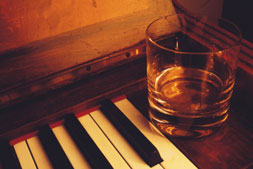|
Bartenders Guide: Whiskey
"I love to sing, and I love to drink Scotch. Most people would rather hear me drink Scotch." Whiskey is a man's drink. This does not mean that women shouldn't drink it. I have in fact witnessed a Catholic school girl suck down a fifth of Jack like it was tax-deductible. Sadly, this is probably what empowered her to refuse to marry me, but I digress. What I mean, is that there is something inherently male about it, this beverage of smoke and leather and fire. Women who can appreciate and enjoy it are sexy like women who smoke the occasional cigar or don a man's tuxedo...you want her, instantly. Meanwhile, a guy in a dress is well...a weirdo in a dress. Same thing goes for little pink cocktails. Every time you see a man with a pink cocktail, Burt Reynolds' moustache gets a little bit smaller...and that, my friend, diminishes us all. It is impossible for me to sum up whiskey on a page, or even in a trilogy...there is too much to tell. But if I had to pick one single characteristic that all makers of whiskey share, from the Scots in the Highlands to an Allegheny Shine Runner...it would be pride. I've never met a whiskey man, or woman, who didn't take excessive, almost fanatical pride in what they had made. I have my preferences. Some bourbons I find too sweet, some Scotch too medicinal. Now and then Jack's charcoal bite just clashes with whatever mood I happen to be in. You don't have to like everything, either. But try them...try them all, and respect them. Somebody's heart is in there, I guarantee you.
All whiskies are made from fermented grain mash, which is then distilled, aged in wood and (usually) cut with water. This is a lot like saying "all breads are made with flour and water." A bagel and a saltine are hardly the same thing, and neither are a bourbon and a Scotch. Several grains may be used, including: barley, malted barley, rye, malted rye, wheat, and maize (corn). There are several sub-types of whiskey that are labeled according to strict legal standards. The grains used and methods of production vary greatly, and this is what makes each type unique.
The major sub-types of Whiskey are: Bourbon - Strictly American product made to exact standards. Click here. Irish Whiskey - Must be made in Ireland from both malted and unmalted grains. Peat is rarely used for malting. Click here. Scotch Whisky - Must be made in Scotland and is malted. If there's no "e", this almost always refers to Scotch. Click here. Tennessee Whiskey - although this sub-type is officially recognized, it differs from bourbon only in that it is filtered through Sugar Maple charcoal. Jack Daniels is a leading example. Japanese Whisky - made in a similar style as Scotch and recently gaining recognition as a serious competitor. Click here. Rye Whiskey - Made from at least 51% rye and currently enjoying a small revival. Click Here.
|





